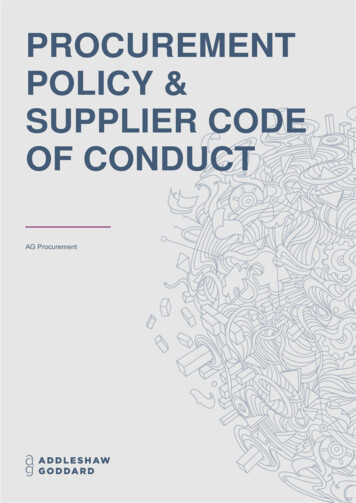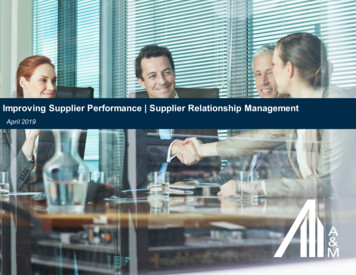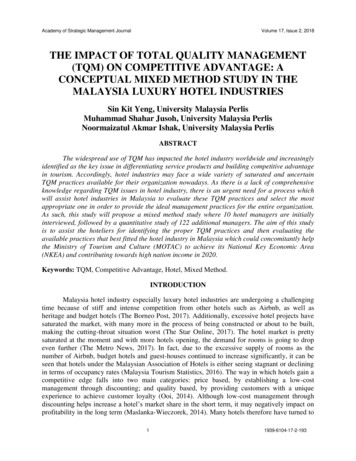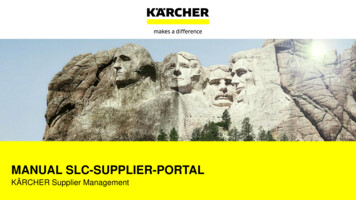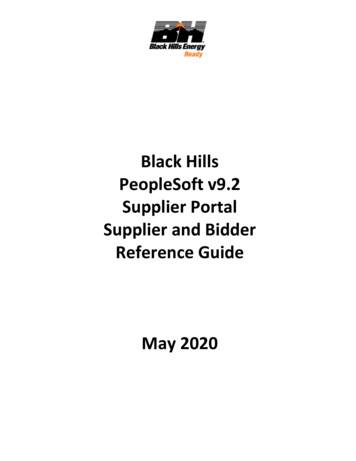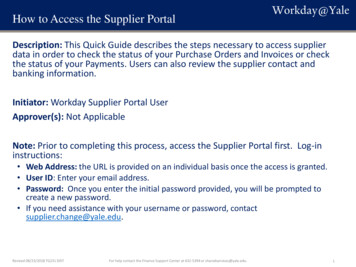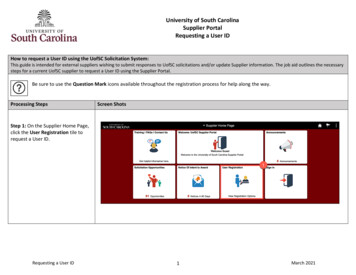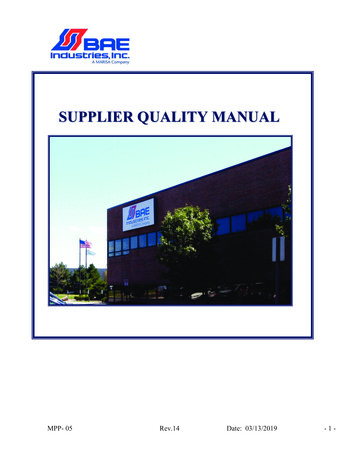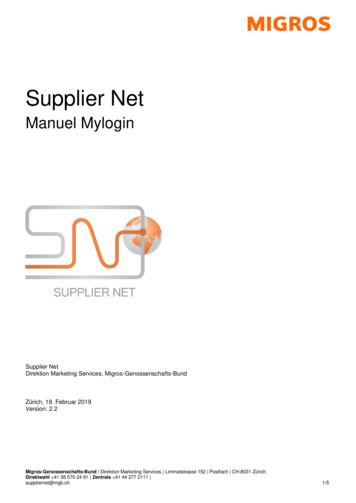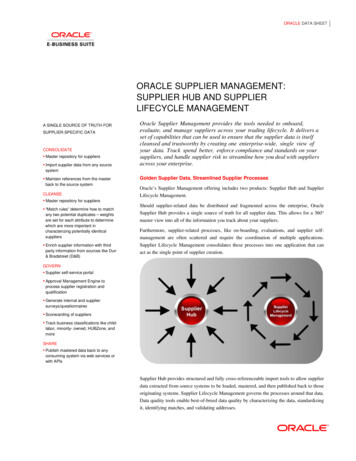
Transcription
SupplierCode ofConduct
thyssenkrupp Supplier Code of Conduct Our understanding of sustainability insupplier managementFor thyssenkrupp AG and its affiliated companies (collectively referred to as“thyssenkrupp”), sustainability is an essential element in the thyssenkrupp missionstatement and an integral component of our business strategy. thyssenkrupp is aninternational group of companies that develops technologies and solutions for futuremarket and customer demands. To secure the sustainable success of our customerswith innovative product and service solutions, we procure our raw materials, goodsand services from suppliers all around the world. Our relationships with them arebased on responsible corporate governance that focuses on long-term value creation.This is why our suppliers are fully integrated in our sustainability strategy.In our procurement activities, we not only observe legal, commercial, technical and process-related criteria, butalso consider social and ecological aspects such as human rights, working conditions, anti-corruption, as well asenvironmental and climate protection. We have been systematically improving the energy and climate efficiencyof our production processes for many years and, together with our customers and suppliers, aim at developingefficient solutions to further reduce our greenhouse gas emissions. thyssenkrupp has also set itself ambitioustargets on the way toward becoming greenhouse gas neutral. Our long-term goal is for our group to be completelyclimate neutral by the year 2050. This is why our sustainability activities also focus on reducing the CO2 emissionsthrough the entire life-cycle of our products, from development and production all the way to recycling. In ourefforts to reduce the CO2 footprint of our products, our supplier network plays an important role.Responsible conduct is an important consideration in our procurement processes. We award contracts not onlyon the basis of legal, commercial, technical and process-related criteria, but also on the basis of social,environmental and ethical standards. Sustainability thus plays an important role for thyssenkrupp when makingdecisions in favor of or against a supplier.To facilitate the decision-making process, thyssenkrupp has developed a Supplier Code of Conduct that clearlydefines the expectations we have of our suppliers. The Supplier Code of Conduct is based on the principlespostulated in the United Nations Global Compact and the Universal Human Rights Declaration of the UnitedNations. Our goal is to only work with suppliers who comply with the principles set out in these UN declarationsand who comply with the relevant national laws.In cases where a supplier violates these principles and fails to adhere to or implement the necessary remedialmeasures, thyssenkrupp reserves the right to review its decision on commencing or continuing the businessrelationship with that supplier. This Supplier Code of Conduct is therefore provided to our suppliers with the aimof reinforcing our mutual understanding of how the principles described in the following sections are to beimplemented in our cooperation.11)Our publications use gender-neutral language.For the sake of a consistent reading flow, we omit any gender-specific charactersand use a gender-neutral language that includes all genders wherever possible.3
4 Human rights and employee rightsthyssenkrupp expects its suppliers to comply with the UnitedNations International Charter on Human Rights, comply with therelevant laws and legal system in the respective countries and atthe respective sites, respect the fundamental rights of employeesunder the respective national laws, and to endorse the core laborstandards published by the International Labour Organization (ILO).thyssenkrupp also expects its suppliers to respect the rights of thirdparties and to minimize any potential interference with these rightswhile observing all international standards.Child laborthyssenkrupp expects its suppliers to comply with the ILO corelabor standards and in this context prohibit and refrain from anykind of child labor in their companies.Discriminationthyssenkrupp expects suppliers to provide a work environment thatis in all aspects completely free from any kind of discrimination.No employee working for the supplier shall be discriminatedagainst, favored, or harassed due to personal characteristicsincluding their gender, skin color, religion, nationality, political orother convictions, ethical origin, physical disability, age, sexualorientation and identity, or other personal characteristics.Forced Laborthyssenkrupp expects its suppliers to prohibit any kind of forced,compulsory labor and human trafficking in their companies and torefrain from becoming involved in any such activities. All workmust be performed on a voluntary basis. Subject to any statutorytermination notice periods, employees must be at liberty toterminate their employment at their discretion. Forced labor meansany types of debt bondage. thyssenkrupp expects its suppliers toprohibit any and all coercive actions, such as the withholding ofidentification documents, passports, educational certificates, workpermits or security deposits as conditions for employment.Freedom of associationthyssenkrupp expects its suppliers to respect the rights of itsemployees, to form an employee representation body, and toengage in collective bargaining in accordance with the relevantnational laws.Compensation and working timethyssenkrupp expects its suppliers to comply with the respectivenational laws pertaining to working time. If no national laws exist,the international standards published by the ILO shall apply.Suppliers are also expected to pay their employees a compensation that conforms with the relevant national laws and the legallyprescribed minimum wage and benefits to be guaranteed by theemployer.Protection of the right to free speech, personaland privacy rightsthyssenkrupp expects its suppliers to respect their employees’ rightto free speech and to protect their personal and privacy rights.Occupational health and safetythyssenkrupp expects its suppliers to conform with the relevantnational occupational health and safety regulations and to assurehumane working conditions. In order to prevent accidents andworkrelated illnesses in the best possible way, thyssenkruppexpects its suppliers to install and apply an adequate occupationalhealth and safety management system (e.g. in accordance withISO 45001). This includes the identification, assessment andreduction of actual and potential accident and health risks, theascertainment and investigation of incidents, the training andinduction of employees in a manner understandable for them, theprovisioning of suitable work equipment and personal protectiveequipment, as well as adequate precautionary and emergencyresponse measures.Environmental protectionthyssenkrupp expects its suppliers to conform with the relevantnational energy and environmental laws, regulations and standards.Suppliers are also expected to install and apply an adequateenvironmental and energy management system. We also expectresources, e.g. energy, water and raw materials, to be consumedefficiently and responsibly while utilizing technologies aimed atpreventing and reducing waste, CO2, wastewater contaminations,and emissions of hazardous substances. thyssenkrupp encouragesits suppliers to also implement the fundamental rules and principlesset out in the thyssenkrupp Group Environmental and Energy Policy.thyssenkrupp expects its suppliers to assure transparency withrespect to their own emissions as well as upstream activities.Suppliers are further expected to implement effective measuresaimed at reducing their direct and indirect CO2 emissions inaccordance with the Paris Climate Agreement, to work oncontinuous improvements, and to further advance the use ofrenewable and alternative energy sources.Integrity in business conductthyssenkrupp expects its suppliers to comply with all applicablelaws, rules and regulations in the countries they operate or conductbusiness in, and to also implement measures that are suitable toensure compliance with said laws, rules and regulations.
thyssenkrupp Supplier Code of Conduct 5Preventing corruption and briberythyssenkrupp expects its suppliers to implement a zerotolerancepolicy with regard to corruption and to comply with theconventions of the United Nations (UN) and the Organization forEconomic Cooperation and Development (OECD) for combatingcorruption, as well as the applicable anti-corruption laws andregulations, including those that deal with bribery in foreigncountries. The supplier must reject any form of corruption, bribery,theft, embezzlement, fraud or extortion and must not tolerate anyillegal payments or granting of other benefits to individual persons,companies or public officials with the objective of influencingdecision-making processes. In particular, the supplier must underno circumstances grant or accept – neither directly nor indirectlythrough third parties – any bribes, payoffs, kick-back payments orother illegal payments, incentives, courtesies or other advantagesor valuable benefits in exchange for business opportunities, theexpedition or simplification of official acts (bribes or facilitationpayments) or related to business activities of thyssenkruppcompanies.thyssenkrupp expects suppliers to adequately manage all of theirinformation systems that store confidential information or data ofthyssenkrupp, and to implement adequate technical measures toprotect them against unauthorized access.Invitations and giftsthyssenkrupp expects its suppliers to refrain from misusinginvitations and gifts for the purpose of influencing businesspartners, customers or public officials. Any invitations and giftsextended to thyssenkrupp employees or related persons mustbe appropriate in terms of occasion and value, i.e. they are ofminor value and can be interpreted as an expression of generallyaccepted local business customs. The suppliers are in the sameway expected to not request any undue benefits from thyssenkruppemployees.Fair use of external personnel and contractorsthyssenkrupp expects its suppliers to comply with all relevantnational laws and to safeguard human rights and labor rights intheir contractual and work relations. This includes the supplier’suse of external personnel and contractors, irrespective of the typeof contract (e.g. contract for work or to hire personnel).Preventing conflicts of interestthyssenkrupp expects its suppliers to make decisions concerningtheir business activities with thyssenkrupp on the basis ofexclusively objective criteria. Conflicts of interests with privateaffairs, commercial or other activities, including those of relativesand other related persons or organizations, are to be preventedright from the beginning.Fair competition – compliance with anti-trustand competition lawthyssenkrupp expects its suppliers to uphold fair competitionand comply with the applicable anti-trust and competition laws.Suppliers shall neither be involved in anticompetitive agreementswith competitors in breach of anti-trust law, nor shall they abuse apotentially existing dominant market position nor be involved in anyother anticompetitive practices.Data protection and information securitythyssenkrupp expects its suppliers to take the protection ofpersonal data seriously and to observe all relevant data protectionlaws. The processing of personal data without a suitable legalbasis is strictly prohibited.Preventing money-laundering and terrorist financingthyssenkrupp expects its suppliers to comply with the applicablestatutory obligations pertaining to the prevention of moneylaundering and terrorist financing, and to refrain from becomingdirectly or indirectly involved in any money-laundering activities orterrorist financing.Trade compliancethyssenkrupp expects its suppliers to strictly comply with therelevant international and national foreign trade regulations,including in particular regulations concerning export controlsand embargoes, and to refrain from being involved in any illegalbusiness dealings with persons, companies or organizationsthat are subject to sanctions.Requirements for supply chains and duediligence obligationsthyssenkrupp values constructive cooperation with its suppliers.In the same way that thyssenkrupp is committed to treating itsemployees, customers, suppliers and neighbors responsibly andfairly, we expect our suppliers to also act in accordance with theprinciples and rules set out in this Supplier Code of Conduct.thyssenkrupp expects its suppliers to comply with the relevantrequirements for supply chains and due diligence requirementsin their respective countries, to assure that all of the principlesand requirements described in this Supplier Code of Conduct arealso endorsed and observed by their affiliated companies, and tomake reasonable efforts in their upstream supply chain to ensuretheir own suppliers comply with the fundamental principles setout in this Supplier Code of Conduct. “Affiliated companies” inthis context means companies in which the supplier holds a director indirect economic interest of at least fifty percent (50%), or inwhich the supplier directly or indirectly holds at least fifty percent(50%) of the voting rights.
6 Conflict minerals and high-risk raw materialsthyssenkrupp expects its suppliers to duly exercise their duty ofcare to promote responsible raw material supply chains and tocomply with all applicable statutory rules pertaining to conflictmaterials. We expect minerals, particularly including tin, tantalum,tungsten, gold and their ores and metals, to be procured fromconflict-free sources. In cases where a product contains one orseveral conflict minerals or high-risk raw materials, e.g. cobalt,which is an important raw material for producing batteries,thyssenkrupp expects its suppliers to assure and provide, onrequest, transparency of their supply chain all the way to thesmelter and origin of the material.The aim is to exclude smelters without an adequate or certified duediligence process.Quality standards and management of product risksthyssenkrupp expects its suppliers to at all times meet the technicaland statutory requirements pertaining to the quality of products andprocesses. Any detected defects or shortcomings must be correctedpromptly and the cause must be investigated and eliminatedpermanently. Supplier processes shall, as a general rule, becontinuously scrutinized and improved with the objective ofincreasing their performance in terms of function, costs andtimeliness.Reporting of potential misconductLegitimate whistleblowing reports can help counteract violationsat an early stage and limit the damage for thyssenkrupp, ouremployees and business partners. Reports can be made by allthyssenkrupp employees, as well as suppliers, customers andother third parties – anonymously if required – using a numberof different channels.If there are concrete indications of a potential violation that couldpotentially affect thyssenkrupp, we request our suppliers to reportthem using our whistleblower system available at the following link:https://www.thyssenkrupp.com/compliance-wbAn online-based whistleblowing system is available to reportpossible violations of the ILO core labor standards and principles.The system is available ll thyssenkrupp employees as well as suppliers, customersand other third parties can use this system – anonymously ifrequired – to report information about violations of the ILOcore labor standards and principles they become aware of.Reports can also be made using the email krupp protects the interests of whistleblowers by providingthem secure reporting systems, as well as by the commitment totreat the information received confidentially and to use all means toprotect whistleblowers who act in good faith against disadvantagesresulting from reporting their suspicions. thyssenkrupp will alsoprotect the interests of the data subject about whom information isprovided by a whistleblower.thyssenkrupp expects its suppliers to comply with their legalobligations, if any, to install a whistleblowing system.Compliance with the thyssenkrupp SupplierCode of Conductthyssenkrupp requires its suppliers to accept this Supplier Code ofConduct, to complete the self assessment questionnaire based onthis Supplier Code of Conduct or to furnish equivalent alternatives.thyssenkrupp will regularly review the suppliers’ compliance withthe principles and requirements set out in this Supplier Code ofConduct as part of a due diligence process aimed at identifying,reducing and preventing supply chain risks.Any violation of the principles and requirements set out in thethyssenkrupp Supplier Code of Conduct will be considered asignificant breach of contract by the supplier.If there are suspicions that the principles and requirementsdescribed in the thyssenkrupp Supplier Code of Conduct are notobserved (e.g. negative reports in the media), thyssenkruppreserves the right to demand information about the relevantcircumstances from the supplier. thyssenkrupp further has the rightto terminate individual or all contractual relations for good causeand without a notice period with suppliers, who demonstrably failto observe the thyssenkrupp Supplier Code of Conduct or fail tostrive for or implement improvement measures within a reasonablegrace period set by thyssenkrupp.
thyssenkrupp AGthyssenkrupp Allee 145143 EssenGermanytk SCoC V4.0, March 2021sustainability.procurement@thyssenkrupp.com
payments) or related to business activities of thyssenkrupp companies. Invitations and gifts thyssenkrupp expects its suppliers to refrain from misusing invitations and gifts for the purpose of influencing business partners, customers or public officials. Any invitations and gifts extended to thyssenkrupp employees or related persons must
